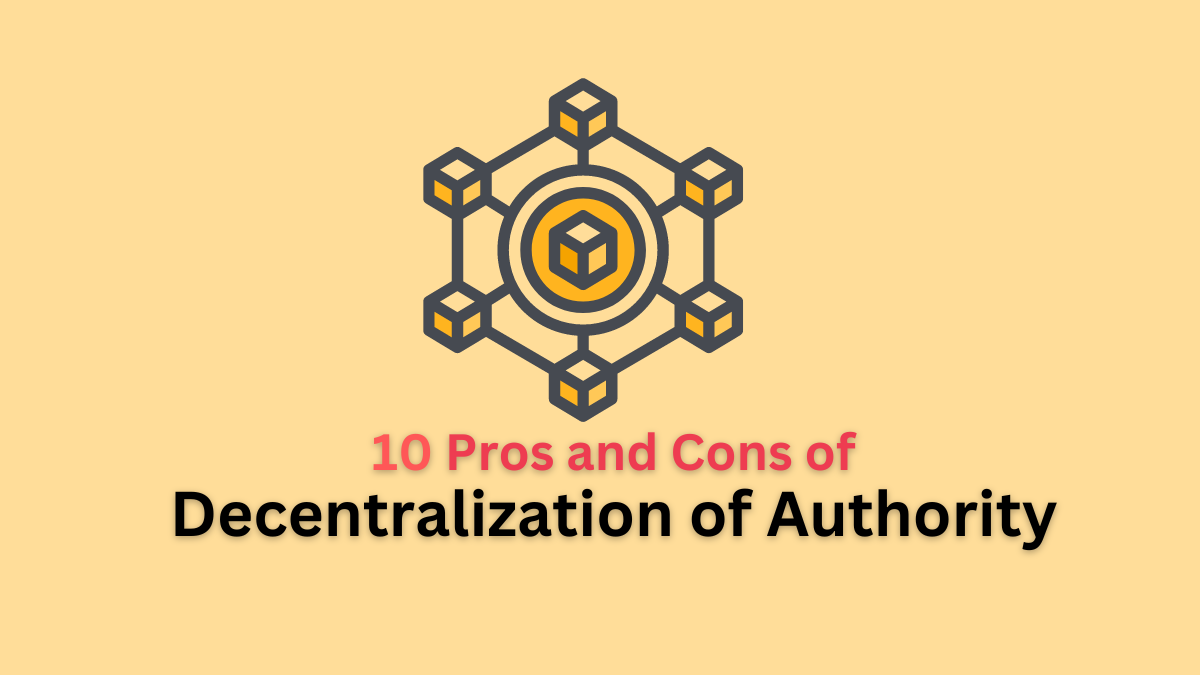Pros and Cons of Decentralization
Decentralization means delegating more authority and decision-making power to lower levels within an organization. This approach contrasts with centralization, where decision-making is concentrated at the top management level.
In this article, we will delve into 10 major pros and cons of decentralization of authority in the workplace, so let’s get started:
Pros of Decentralization of Authority
Below are the five main advantages of decentralization of authority in the workplace:
Enhanced Decision Relevance and Timeliness
Lower-level managers, being closer to their specific operational environments, can make more informed and contextually appropriate decisions. They have a better understanding of local issues, customer needs, and immediate operational challenges.
This leads to decisions that are more relevant and effective for the specific contexts in which they are made, enabling the business to respond more quickly to changes and challenges.
Improved Employee Motivation and Job Satisfaction
Decentralization empowers employees by giving them more control and autonomy over their work. When employees have a say in decision-making processes, they feel more valued and integral to the organization’s success.
This increased sense of responsibility and empowerment boosts job satisfaction and motivation, leading to higher productivity and lower turnover rates.
Facilitation Organizational Growth and Diversification
As companies expand and diversify their operations, central management can become overwhelmed with the complexity of decision-making. Decentralization helps manage this complexity by delegating authority to divisions or regions, each responsible for its operations.
This structure supports faster decision-making and better adaptation to local market conditions, thereby facilitating effective growth and diversification.
Development of Managerial Talent
By delegating decision-making authority, lower-level managers gain practical experience in handling responsibilities that prepare them for higher roles.
This on-the-job training helps build a reservoir of capable managers who are well-prepared to take on leadership positions, ensuring a steady pipeline of talent for succession planning.
Read More: 10 Pros and Cons of Customer Departmentalization
Increased Organizational Flexibility and Responsiveness
Decentralization makes organizations more agile and responsive to external changes and internal needs. With decision-making authority distributed throughout the organization, individual units can quickly address issues and implement changes without waiting for approval from the top.
This flexibility is crucial in dynamic business environments where rapid adaptation can be a competitive advantage.
Cons of Decentralization of Authority
Now, let’s explore the 5 major disadvantages of decentralization in business:
Risk of Poor Coordination and Synergy
One of the main challenges of decentralization is maintaining coordination across different units or divisions.
When decision-making is spread out, it can lead to inconsistent practices and policies, which might conflict with the overall strategic goals of the company. Poor coordination can result in inefficiencies, duplicated efforts, and a lack of synergy between different parts of the organization.
Read More: 10 Pros and Cons of Process Departmentalization
Potential Loss of Control by Top Management
Delegating authority to lower levels means that top management has less direct control over day-to-day decisions. This can lead to a situation where strategic alignment with the company’s vision and objectives might be compromised.
Furthermore, if lower-level managers lack the necessary competence or experience, their decisions could negatively impact the business, reflecting poorly on top management.
Higher Operational Costs
Decentralization can lead to increased costs due to the potential for duplicated functions and inefficiencies. For example, if each division makes its own procurement decisions, the company might miss out on bulk purchasing discounts, leading to higher expenses.
Additionally, maintaining effective control and coordination mechanisms to support decentralization can also add to operational costs.
Read More: 10 Pros and Cons of Delegation of Authority
Challenges in Ensuring Quality and Consistency
Ensuring consistent quality across different units can be challenging when authority is decentralized. Lower-level managers might make decisions that meet local needs but do not adhere to company-wide standards.
This inconsistency can affect the overall brand reputation and customer experience, especially in businesses where uniformity and quality control are critical.
Ambiguity in the Chain of Command
Decentralization can sometimes blur the lines of authority and responsibility, leading to confusion and ambiguity in the chain of command.
This can create a situation where multiple managers believe they have the authority to make decisions, potentially leading to conflicts and a lack of clear direction. Such ambiguity can hinder effective management and decision-making processes, especially in complex and rapidly changing environments.
Read Next: 10 Pros and Cons of Job Enrichment
